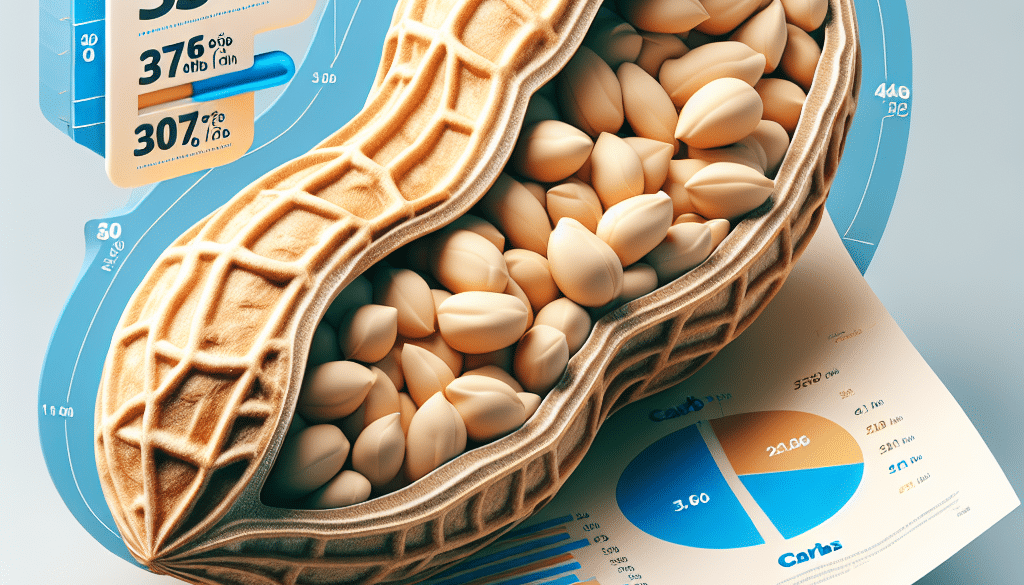Carbs in Peanuts in Shell: Crunchy Carb Count
-
Table of Contents
- Carbs in Peanuts in Shell: Understanding the Crunchy Carb Count
- Nutritional Breakdown of Peanuts
- Carbohydrate Content in Peanuts
- Carbs in Shelled Peanuts
- Health Benefits of Peanuts
- Carbs in Peanuts and Diet Considerations
- Keto Diet and Peanuts
- Diabetes and Peanuts
- How to Include Peanuts in Your Diet
- Conclusion: The Versatile and Nutritious Peanut
- Discover ETprotein’s High-Quality Protein Products
Carbs in Peanuts in Shell: Understanding the Crunchy Carb Count

Peanuts, a popular snack enjoyed by millions worldwide, are not only delicious but also packed with nutrients. Often consumed in their roasted form or as peanut butter, peanuts are a staple in various cuisines and diets. However, for those monitoring their carbohydrate intake, understanding the carb content in peanuts, especially when they are in their shell, is crucial. This article delves into the nutritional profile of peanuts with a focus on their carbohydrate count, providing valuable insights for health-conscious individuals and those following specific dietary plans.
Nutritional Breakdown of Peanuts
Peanuts, despite their name, are not actually nuts but legumes, related to beans and lentils. They grow underground and are harvested for their edible seeds. Here’s a closer look at the nutritional content of peanuts:
- Protein: Peanuts are an excellent source of plant-based protein, making them a favorite among vegetarians and vegans.
- Fats: They contain healthy fats, primarily monounsaturated and polyunsaturated fats, which are beneficial for heart health.
- Fiber: Peanuts are a good source of dietary fiber, which aids in digestion and promotes satiety.
- Vitamins and Minerals: Rich in vitamins like niacin, folate, and vitamin E, and minerals such as magnesium, phosphorus, and potassium, peanuts are a nutrient-dense food choice.
Carbohydrate Content in Peanuts
When it comes to carbohydrates, peanuts have a relatively low count, which makes them a viable option for low-carb diets. The carbs present in peanuts are mostly complex carbohydrates, which have a minimal impact on blood sugar levels compared to simple sugars.
Carbs in Shelled Peanuts
For those who prefer peanuts in their shells, it’s important to note that the shell itself is not typically consumed and therefore does not contribute to the carb count. A one-ounce serving (about 28 grams) of shelled peanuts contains approximately:
- Total Carbohydrates: 4.6 grams
- Dietary Fiber: 2.4 grams
- Net Carbs: 2.2 grams
Net carbs are calculated by subtracting the grams of fiber from the total carbohydrates, as fiber is not digested and absorbed by the body in the same way other carbs are.
Health Benefits of Peanuts
Despite their carb content, peanuts offer a range of health benefits:
- Weight Management: The protein and fiber in peanuts can help keep you full, reducing overall calorie intake.
- Heart Health: The monounsaturated fats in peanuts contribute to a healthy heart and lower cholesterol levels.
- Blood Sugar Control: The low glycemic index of peanuts makes them a good snack for maintaining stable blood sugar levels.
- Disease Prevention: Regular consumption of peanuts has been linked to a reduced risk of certain diseases, including gallstones and heart disease.
Carbs in Peanuts and Diet Considerations
For individuals following specific diets, such as ketogenic or low-carb diets, peanuts can be included in moderation due to their low net carb content. However, portion control is key, as the calories from peanuts can add up quickly.
Keto Diet and Peanuts
In a ketogenic diet, where the focus is on high-fat, moderate-protein, and low-carb foods, peanuts can be a suitable snack. The high fat and moderate protein content align with the keto diet’s requirements, while the low net carbs help maintain ketosis.
Diabetes and Peanuts
For those managing diabetes, peanuts can be a smart choice due to their minimal impact on blood sugar levels. The fiber content in peanuts also helps slow down the absorption of carbohydrates, preventing spikes in blood sugar.
How to Include Peanuts in Your Diet
Peanuts can be enjoyed in various forms and incorporated into different meals:
- As a snack: Eat a handful of peanuts between meals to curb hunger.
- In salads: Add chopped peanuts for a crunchy texture and extra protein.
- In stir-fries: Peanuts can add flavor and nutrients to vegetable or meat stir-fries.
- As peanut butter: Spread natural peanut butter on whole-grain toast or add it to smoothies.
Conclusion: The Versatile and Nutritious Peanut
Peanuts in their shell are a nutritious snack with a relatively low carbohydrate count, making them suitable for various diets. Their high protein, healthy fats, and fiber content offer numerous health benefits, from weight management to heart health. When consumed in moderation, peanuts can be a valuable addition to a balanced diet.
Discover ETprotein’s High-Quality Protein Products
If you’re looking to complement your diet with high-quality protein sources, consider ETprotein’s range of organic bulk vegan protein and plant proteins. Their products, including peanut protein, are designed to meet the needs of various industries and dietary preferences. With a commitment to non-GMO, allergen-free ingredients, ETprotein ensures that you receive the best in nutrition and taste.
About ETprotein:
ETprotein, a reputable protein Chinese factory manufacturer and supplier, is renowned for producing, stocking, exporting, and delivering the highest quality organic bulk vegan protein and plant proteins. They include Organic rice protein, clear rice protein, pea protein, clear pea protein, pumpkin seed protein, sunflower seed protein, mung bean protein, peanut protein etc. Their offerings, characterized by a neutral taste, non-GMO, allergen-free attributes, cater to a diverse range of industries. They serve nutraceutical, pharmaceutical, cosmeceutical, veterinary, as well as food and beverage finished product distributors, traders, and manufacturers across Europe, USA, Canada, Australia, Thailand, Japan, Korea, Brazil, and Chile, among others.
ETprotein specialization includes exporting and delivering tailor-made protein powder and finished nutritional supplements. Their extensive product range covers sectors like Food and Beverage, Sports Nutrition, Weight Management, Dietary Supplements, Health and Wellness Products, and Infant Formula, ensuring comprehensive solutions to meet all your protein needs.
As a trusted company by leading global food and beverage brands and Fortune 500 companies, ETprotein reinforces China’s reputation in the global arena. For more information or to sample their products, please contact them and email sales(at)ETprotein.com today.














